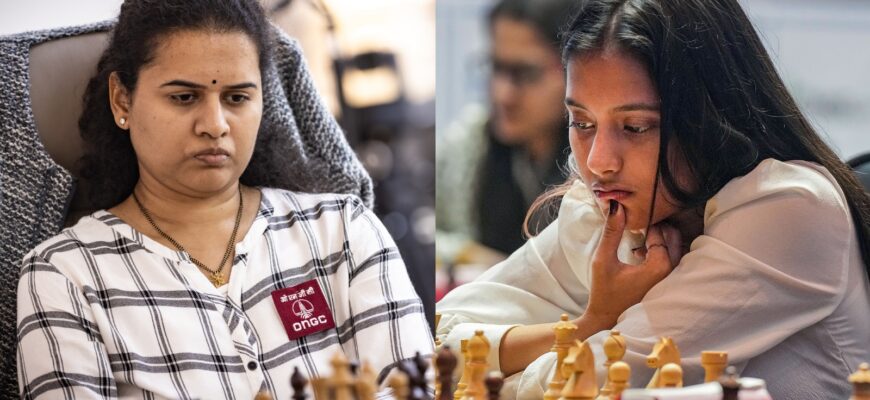The global chess community watches with bated breath as the 2025 Women`s Chess World Cup culminates in an historic, all-Indian final. The clash between veteran Koneru Humpy and rising star Divya Deshmukh is more than just a battle for a title; it`s a testament to India`s undeniable ascendancy in the world of chess.
A Shift in the Chess Cosmos
For decades, the narrative of women`s chess often revolved around the formidable strength of Chinese Grandmasters. Their consistent presence at the pinnacle, with numerous world champions hailing from the nation, cast a long shadow over the international landscape. Yet, as the curtain falls on the 2025 Women`s Chess World Cup semifinals, a new era has definitively dawned. Both Koneru Humpy and Divya Deshmukh, representing India, navigated grueling matches against top-seeded Chinese players to secure their spots in the final. This isn`t merely a victory; it`s a definitive changing of the guard, a pronouncement that the strategic heart of chess is now beating vibrantly on the Indian subcontinent.
The Semifinal Saga: Nerves, Blunders, and Brilliance
The path to an all-Indian final was anything but straightforward, marked by the kind of high-stakes drama that keeps spectators glued to their screens. The semifinals pitted India`s finest against China`s stalwarts, promising a true test of nerve and skill. Divya Deshmukh, the 19-year-old prodigy, exhibited remarkable composure as she systematically dismantled her opponent, Tan Zhongyi. Her journey, overcoming seeded players and demonstrating a maturity beyond her years, has been a highlight of the tournament.
Koneru Humpy, the seasoned Grandmaster, faced an equally formidable challenge against Lei Tingjie. After a series of hard-fought draws in the classical games, the tie-breaks unfolded into a thrilling display of rapid chess. Humpy found herself needing a win on demand after a loss in the first 10-minute rapid game – a scenario designed to test even the calmest of minds. Yet, she delivered. Her subsequent performance, a masterclass in controlled aggression and precision, not only nullified the pressure but reversed the momentum, allowing her to dominate the blitz tie-breaks and clinch her spot with a decisive 5-3 scoreline. It was a performance that scoffed at the concept of pressure, a testament to her enduring legacy.
A Generational Collision: Experience Meets Youthful Fire
The final promises a fascinating encounter: a generational clash between two extraordinary talents. On one side stands Koneru Humpy, a name synonymous with Indian chess excellence for over two decades. At twice Divya`s age, Humpy brings a wealth of experience, strategic depth, and an unflappable temperament forged in countless battles. She is a former World Rapid Champion, a testament to her enduring prowess.
Opposite her is Divya Deshmukh, the tenacious 19-year-old whose rapid ascent has captivated the chess world. Having dispatched two top-ten players and the world No. 12 on her way to the final, Deshmukh arrives not as an underdog, but as a formidable contender, her form undeniable. The statistical gap in ELO ratings and FIDE rankings that once separated them seems to have evaporated under the heat of her tournament performance. This final isn`t just about who is better; it`s about the very evolution of Indian chess – how a revered legend and a vibrant new force push each other to their limits.
“I think it`s one of the happiest moments for our chess fans, because the title is India`s for sure. It will be a tough game, Divya has played tremendously well throughout the tournament,” Humpy graciously remarked after her semifinal victory.
The Roar of the Indian Lion: Beyond Individual Triumph
This all-Indian final is more than an isolated event; it`s a powerful symbol of a broader phenomenon. From India`s historic team gold medal sweep at the Olympiad to D. Gukesh becoming the World Champion, the nation has undeniably established itself as a global chess superpower. The consistent production of elite talent, across both genders and age groups, indicates a deeply rooted and thriving chess culture.
What was once celebrated as an exceptional achievement for an Indian chess player is now, with a polite nod, becoming the expected norm. The general reaction to the possibility of multiple Indian players in prestigious events like the Candidates Tournament is no longer awe, but perhaps a contented shrug – a subtle irony reflecting the new reality. This phenomenon is unique in India`s sporting history, where such sustained dominance across multiple categories in a single sport is rare. The winds of power, indeed, are blowing decisively in India`s direction.
The Future is Bright, and Indian
Regardless of who lifts the trophy this weekend, one fundamental truth remains: the 2025 Women`s Chess World Cup champion will be Indian. Furthermore, both Humpy and Deshmukh have now secured their coveted spots in next year`s Candidates tournament, a critical step towards challenging for the Women`s World Championship title. The prospect of R. Vaishali and Harika Dronavalli potentially joining them paints an even more vibrant picture for India`s presence at the highest echelons of competitive chess.
This final isn`t an end, but a powerful beginning. It signifies not only individual glory but a collective triumph for Indian chess, promising a future where strategic brilliance and relentless pursuit of excellence are not just encouraged, but celebrated as a national identity on the global chessboard. The trophy may travel to Maharashtra or Andhra Pradesh, but the ultimate winner, unequivocally, is Indian chess itself.









